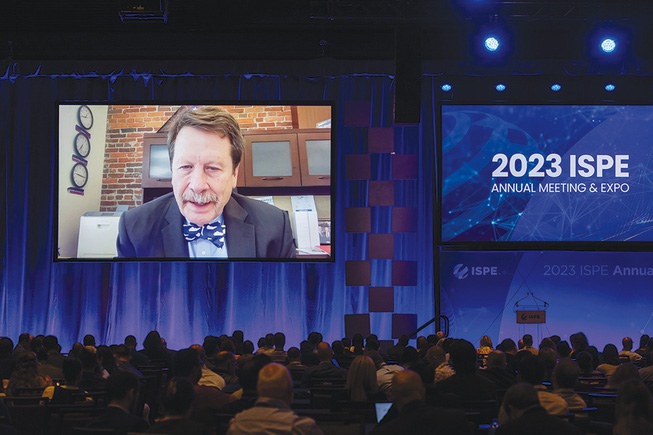
Dr. Robert Califf, commissioner of the U.S. Food & Drug Administration, appears on a screen via video link Monday, Oct. 16, 2023, at the 2023 International Society for Pharmaceutical Engineering expo at Mandalay Bay. Califf talked about a number of issues, including drug shortages.
Tuesday, Oct. 17, 2023 | 2 a.m.
In the past few years, the United States has seen a rise in drug shortages that’s affected groups from Type 2 diabetics needing Ozempic to improve their glycemic control to patients needing Adderall to treat their attention-deficit hyperactivity disorder (ADHD).
But some of the drugs most vulnerable to shortages can be generics, said Dr. Robert Califf, commissioner of the U.S. Food and Drug Administration, who participated in a panel virtually Monday at the International Society of Pharmaceutical Engineers Expo at Mandalay Bay.
The reasons vary from supply chain issues to economics.
Califf explained that generic drugs, which are sold at lower prices than their name-brand counterparts, generally generate only thin profits for their manufacturers. When the price of selling generic drugs falls below what it costs to make them, Califf said “you’re guaranteed to lose money.”
It’s the main reason many companies don’t take the gamble on manufacturing generic drugs, despite their popularity among patients and insurers.
“We should also remember that generic drugs are an amazing public health care to humankind,” Califf said in a virtual interview at the ISPE Expo. “Our world needs access to generic drugs.”
It also doesn’t help, Califf told his Las Vegas audience, that issues related to climate change have affected some of the processing plants and procurement of raw materials.
A tornado hit a Pfizer manufacturing plant in July in Rocky Mount, N.C., even though the peak season for the violent storms typically ends in May. The delays caused by the plant closure created panic among drug purchasers while also resulting in supply chain issues.
“There’s not enough reserve and supply,” the FDA commissioner said, and “there’s too much at stake when shortages occur.”
To get more companies interested in creating generic drugs, Califf argued that the “economics of the industry” needed to be fixed by helping pharmaceutical companies gain the security to attract investors that will help them produce high-quality products and build a stockpile for emergencies.
The FDA is also working on a proposal to Congress that would give it earlier notification when drug demands go up or an impending shortage is discovered.
Last year, a spike in respiratory illnesses in children and a shortage of amoxicillin — an antibiotic used to treat bacterial infections — even forced many stores to limit the purchases of over-the-counter fever-reducing medicines for children.
By the third quarter of2023, there were 305 drug shortages, according to the University of Utah Drug Information Service. That’s 45 more drug shortages than around the same time last year, the data shows.
“Right now, we’ve got 200 to 300 impending (drug) shortages every year, and it will continue that way until we fix the economics of the industry,” Califf said to the expo attendees.
COVID on their minds
Health officials and pharmaceutical experts attending the ISPE Expo on Mondayalso delivered a clear message to the public: Get your updated COVID-19 vaccines.
Thomas Hartman, president and CEO of the International Society for Pharmaceutical Engineering, said there was rightfully some concern about COVID-19 as the weather turns colder and brings an expected climb in cases.
“I think the data is clearly there that suggests that individuals who are in certain risk groups should not contemplate (not) taking the vaccine and they should continue monitoring their personal health, particularly those in susceptible groups — overweight, elderly,” Hartman said. “I think it’s an important part of self-responsibility and responsibility for the society.”
Such concerns pushed the U.S. Food and Drug Administration to provide updated COVID vaccine emergency authorization for use beginning this fall.
EG.5 or Eris, a subvariant of COVID, is estimated to be the dominant variant circulating around the U.S. It is estimated to have made up almost 24% of all known COVID cases as of Oct. 14, according to the Centers for Disease Control and Prevention.
As of Oct. 5, Clark County was seeing a seven-day moving average of 36 people testing positive for COVID, according to the Southern Nevada Health District. About 12 people a day were being hospitalized with the virus, although no local COVID deaths have been reported during the target period, the data shows. (The data doesn’t include residents who took home tests.)
In Southern Nevada, about 75% of the population has received at least one dose of the COVID vaccine, the Health District said.
Updated vaccines from Pfizer and Moderna have been rolling out since September, and they are intended for adults and children as young as 6 months old. The updated vaccine is free through private insurance or Medicare, and the CDC has a program to provide free shots to the uninsured or underinsured.
